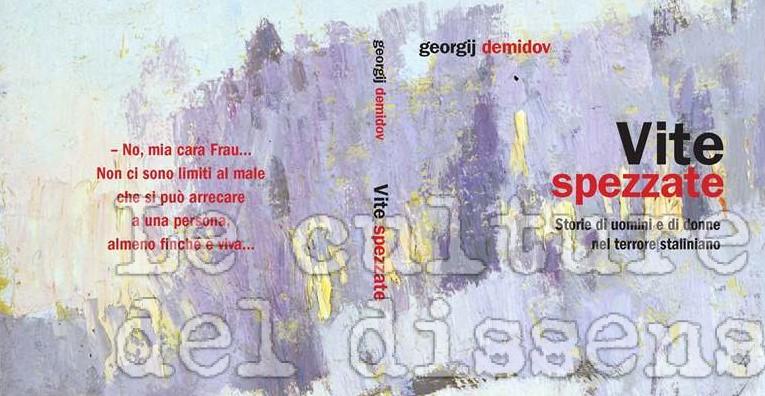
09 May Short stories (by Georgij Demidov)
AUTHOR
Georgij Georgevič Demidov (St. Petersburg 1908 – Kaluga 1987)
YEARS WRITTEN
1956-1980
FIRST PUBLISHED IN
1991
PERIODICAL
Ogonëk
PLACE OF PUBLICATION
Moscow
DESCRIPTION
Georgij Demidov started writing on his return from Kolyma (1956) but the precise dates on which the works were written are not known. His work can be divided into: a) Novellas, set in cities (povesti); b) Short stories, set in the gulag (rasskazy); c) His autobiographical novel.
The novellas Fonè Kvas (very likely written in 1957 or 1958), Oranževyj abažur (“The Orange Lampshade” – 1964-68) and Dva prokurora (“Two Prosecutors” – 1969-1974) were first published in the volume Oranževyj abažur (2009). The main character in Fonè Kvas is an engineer who, after being arrested, tries to avoid being convicted by admitting to everything that is put to him by the investigating commission, including denouncing his co-workers; the main character in Oranževyj abažur, which is largely autobiographical, is also an engineer. However, he has two goals: saving his dignity, and saving his own family. The protagonist of the third novella Dva prokurora, is a young provincial prosecutor who is struck by the injustices perpetrated in front of him by the NKVD; his unshakeable faith in Stalin and in the justice of the Soviet system, however, convince him to travel to Moscow to denounce the abuses that he has witnessed to State Prosecutor Vyšinskij.
The short stories collected in Čudnaja planeta (“Wonderful Planet” – 2008), whose title is based on the ditty of the same name, were written between the sixties and the early seventies, although they were probably reworked several times. Among the others, the most notable are Amok (n.d.), Intellektual (Priznak Koši) (The Intellectual / Cauchy’s Principle – 1973), Bez birki (“Not Tagged” – 1966), Oborvannyj duèt (“The Interrupted Duet” – 1973). The most famous short story of this collection is Dubar’ (“The Little Corpse” – 1966), which was also the first (and last) to be published in the USSR, in 1990, in the journal Ogonëk. At the beginning of the 1990s, the planned publication of other short stories (including by the Sovetskij pisatel’ publishing house) was stopped for a variety of reasons, mostly financial.
A third collection, (Ljubov’ za koljučej provolokoj. Povesti i rasskazy, “Love behind barbed wire. Novellas and short stories”) was published in 2010. This included, among others, Ubej nemca (“Kill a German” – 1965) and Pod koržom (“Under the Spur” – 1966). Ubej nemca was inspired by a poster that was widely circulated in the USSR during the war. It showed a Soviet soldier killing a German. This poster inspired many patriotic poems and stories by contemporary writers. Demidov’s story tells of two young boys from an isolated village on the Sea of Ochotsk (also known for being the sea of the notorious city of Magadan, where the prisoners bound for the lagers of Kolima were processed) who kill a good man, beloved by all the locals, just because he has a German name. In the third story in the collection, the rocky spur, (korž) under which the deportees are made to work, is a metaphor for the convict’s situation.
Demidov started working on his autobiographical novel in the 1960s, but this was dramatically interrupted in 1980, when all his work was seized by the authorities. It is not clear how far he had progressed. As of today, only the first part (Ot rassveta do sumerek – “From Dawn to Dusk” – 2014) has been published, covering the years from childhood to the Civil War as well as several photographs from those years.
All of Demidov’s works that were published in collections have been published by Moscow’s Vozvraščenie, specialising in Gulag literature.
TRANSLATIONS
Into French: G.G. Demidov, Doubar’ et autres recits (trad. du russe par C. Stoïnov, A. Garcia, A. Gaillard ; [postface de Valentina Démidova], Paris, Hachette – Progres, 1991). Into English: Georgij Demidov, Five fates from a wondrous planet (translated, compiled, and edited by Diane Nemec Ignashev), Moscow, Vozvrashchenie, 2015. Into Italian: Georgij Demidov, Vite spezzate (trad. e a cura di F. Fici), Firenze, Le Lettere, 2018.
In 2010, Georgij Demidov and his work were the subject of a documentary by Svetlana Byčenko: Žitie intelligenta Demidova – Dokumental’nyj fil’m, posvjaščennyj sud’be druga Varlama Šalamova, fizika i pisatelja Georgija Demidova.(The Life of Georgij Demidov, Man of Culture – A Documentary on the Fate of Georgij Demidov, Physicist and Writer, Friend of Varlam Šalamov).
BIBLIOGRAPHY
D. Bykov, Georgij Demidov, in «Diletant», n.12, 2016, pp. 90-95.
M. Čudakova, Echo Kolymy, in «Čudnaja planeta», 2008, pp. 339-353.
M. Čudakova, Ne gnut’ ni sovesti, ni pomyslov, ni šej, in «Oranževyj abažur», 2009, pp. 5-16.
V. Demidova, Buduščemu na prokljatoe prošloe … (intervista) https://shalamov.ru/memory/222/
Č. A. Gorbačevskij, Patriotizm po-kolymski: k technologii transformacii ponjatija, in «Vestnik slavjanskich kul’tur», 3 (33), 2014. ru-prichal-ada.livejournal.com/336976.html
E. Jakovič, Demidov i Šalamov. Žitie Georgija na fone Varlama, in «Vozvraščenie», 2016. https://ru-prichal-ada.livejournal.com/567696.html
E. Moroz, Smertiju smert’ poprav, in «Znamja», n. 8, 2009, pp. 211-215.
E. Rabinovič, Georgij Demidov – neizvestnyj velikij russkij pisatel’, in «Evrejskaja Starina», n. 2, 2017, http://s.berkovich-zametki.com/2017-nomer2-erabinovich/
V.Šalamov, Novaja kniga – Vospominanija, zapisnye knižki, perepiska, sledstvennye dela, Moskva, ESKMO, 2004, pp.752-763.
V.Šalamov, Perepiska s Demidovym, http:// shalamov.ru/library/24/33.html
V.Šubina, Kolyma stanovitsja tekstom, Moskva, Novyj chronograf, 2018
[Fancesca Fici, 2/4/2019]
[Translated by Giovanni Giusti]





